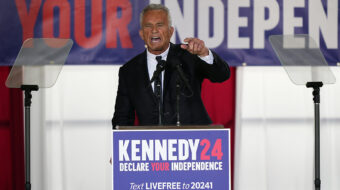
Because of the election of Barack Obama, the American people in their great majority have a leg up, but there is still a long way to go. To his credit, the new president is off to a quick start. In less than three months in office he has:
* Issued an order to close Guantanamo prison and end torture.
* Signed the Lilly Ledbetter bill, giving much greater scope to workers’ discrimination claims.
* Opened up a greatly needed dialogue with the Muslim and Arab world, including overtures to Syria and Iran.
* Ordered the withdrawal of all U.S. troops from Iraq no later than 2011.
* Rolled out a new framework for diplomacy and conflict resolution, notwithstanding an escalation of troops to Afghanistan, which we oppose.
* Reinstated Davis-Bacon Act provisions requiring paying prevailing (union scale) wages on public works projects.
* Changed the framework for nuclear nonproliferation and dismantlement in a very positive way.
* Reversed many Bush administration rulings that have been so harmful to the environment.
* Took some steps to reverse draconian policies toward Cuba.
* Dropped some of the worst aspects of our immigration policy.
* Placed health care at the top of the administration’s agenda.
* Supported new Labor Secretary Hilda Solis’ rulings overturning many anti-labor directives of the Bush years.
I could go on, but I think it is obvious that the Obama administration represents a qualitative break with right-wing extremism and free market fundamentalism.
Not to see this, not to acknowledge this, not to welcome this, no matter whether you live in or outside U.S. borders, is to act like the ostrich that sticks its head in the sand and misses what is happening on the ground.
Immediate challenge
As important as the initiatives are, the immediate challenge for the White House is to revive and then sustain economic activity. So far, the Obama administration has correctly ruled out some standard answers for addressing this economic crisis.
To begin with, no one in the administration thinks the economy on its own will return to near-full capacity and full employment.
Nor does anyone think that the Republican Party prescription to freeze spending is worth a moment’s consideration.
Nor can you find anyone in the White House who believes that the debt overhang — the enormous debt accumulated over nearly three decades — can be reduced except in the long term.
Nor can you find in the administration or among progressive Democrats in Congress anyone who subscribes to the notion that fine-tuning with standard monetary and fiscal tools is enough.
Finally, no one in the Oval Office sees punishing homebuyers as an anti-crisis measure. The fact is that homeowners and especially sub-prime borrowers are neither the cause nor responsible in any way for the housing market collapse.
Moreover, as Joe Sims has laid bare in his article, this Wall Street/Washington-nurtured crisis is steeped in cynical and virulent racism.
Lagging demand
Obama understands that the near- and medium-term problem is lagging demand for goods and services, in other words, insufficient purchasing power in the hands of working people — high income, low income and no income.
The president’s stimulus package goes in this direction. Despite what Republicans say, it is a good measure that will ease the pain of this crisis, create jobs and begin to re-inflate the economy.
The president also understands that the economy has to be restructured if it has any possibility of rebounding in a sustained way. The stimulus package combines elements of stimulus and restructuring, as does his budget, which accents tax shifts and public-sector-led investment in health care, education and energy efficiency.
His plans to institute a new set of regulations on financial markets and his commitment to green jobs, energy and technology are also meant to fuse stimulus and restructuring objectives together.
More far-reaching steps needed
Given the depth and scope of this crisis, in my view, the administration will inevitably have to consider some more far-reaching measures.
At the top of my list are:
1. Counter-crisis spending of a bigger size and scope to invigorate and sustain a full recovery and meet human needs — something the New Deal never accomplished.
2. Passage of the Employee Free Choice Act in order to rebalance power between labor and capital in the economic and political arenas.
3. Managed trade and trade agreements that have at their core the protection and advancement of international working class interests.
4. Equality in conditions of life for racial minorities and women.
5. Amnesty, easy path to citizenship and full democratic rights for undocumented immigrants.
6. Turning education, child care and health care into “no profit” zones.
7. Rerouting investment capital from unproductive investment (military, finance and so forth) to productive investment in a green economy and public infrastructure.
8. Changing the direction of our nation’s foreign policy toward cooperation, disarmament and diplomacy.
9. A full-scale assault on global warming.
10. A serious and sustained commitment to assisting the developing countries, which are locked in poverty and misery.
11. Global cooperation on a new level and with a new content. The era of U.S. imperialism dictating to the world is over; in fact, no state has the political, economic and ideological capital to exercise a dominant influence on world developments. The world is multipolar and that isn’t going to change any time soon, especially as new states emerge, China in the first place, and new configurations of regional power become new global realities.
Unlike at the end of World War II when U.S. imperialism gave stability, coherence and rules to a new global capitalist order, no state today has that capacity, resources or legitimacy. These new correlations of power on a world scale can be an opportunity or a danger. International working class unity is imperative.
12. Democratization of economic life, beginning with democratic public takeover of finance, energy and other industries whose future is problematic if left in private hands.
Democratize our financial system
Public ownership of the financial system, as well as elimination of the shadow banking system and exotic derivatives, is imperative.
The banks and other financial institutions are insolvent because of their speculative activities. Simple capitalist justice would say that financial managers, stockowners and bondholders should eat their losses. Why should taxpayers pick up the tab for their high-stakes gambling in a financial casino?
Some say that financial institutions are too big to fail. But haven’t they failed, and failed spectacularly, already? Some will say yes to this question, but go on to insist that if banks to go belly up, the results will be catastrophic. They will remind us of the panic and credit freeze that followed the meltdown of Lehman Brothers.
The danger of panic, capital flight and market turmoil can’t be dismissed out of hand. Financial markets are deeply and broadly, vertically and horizontally, integrated on a global scale, probably more so than any other market in the global economy. As a consequence, they are quick to melt down steeply and suddenly and spread contagion to other countries, regions and worldwide.
Despite this, radical reform of the financial system — and I would include here the Federal Reserve Bank — makes good sense in the short and long term. We need an efficient, flexible and democratically controlled financial system that assists in the allocation of money to productive uses domestically and internationally.
What makes working people angry is that their tax dollars are going to bail out robbers and they get nothing in return except more debt to pay off in the future.
To allow this situation to go on can badly hurt the new administration and its recovery plans.
Our answer is democratic public ownership, but as important a measure as that is, it is neither a quick fix nor unproblematic. A lot of unknowns exist. The danger of further panic and flight is real.
It appears the president, following the advice of his Treasury secretary and main economic advisor, favors what I call a bank/hedge fund fix to revive our dysfunctional finance markets.
But we shouldn’t consider the case for public ownership closed. The pressure of economic events and the performance of financial markets going forward — not to mention the public anger — could bring this issue to the surface again.
—– Sam Webb (swebb @ cpusa.org) is national chair of the Communist Party USA. This is excerpted from his report to the party’s national committee, March 21, 2009.












Comments